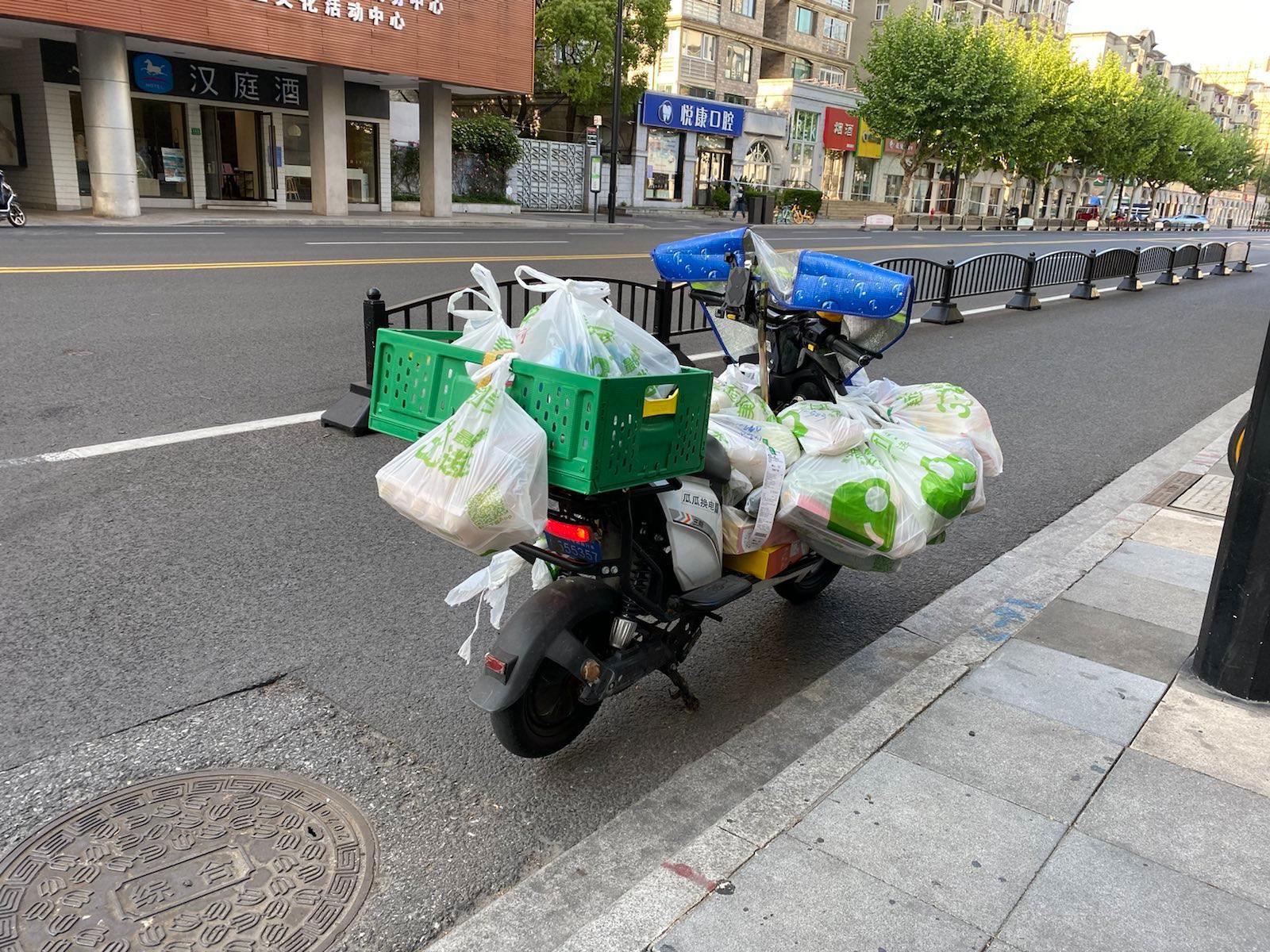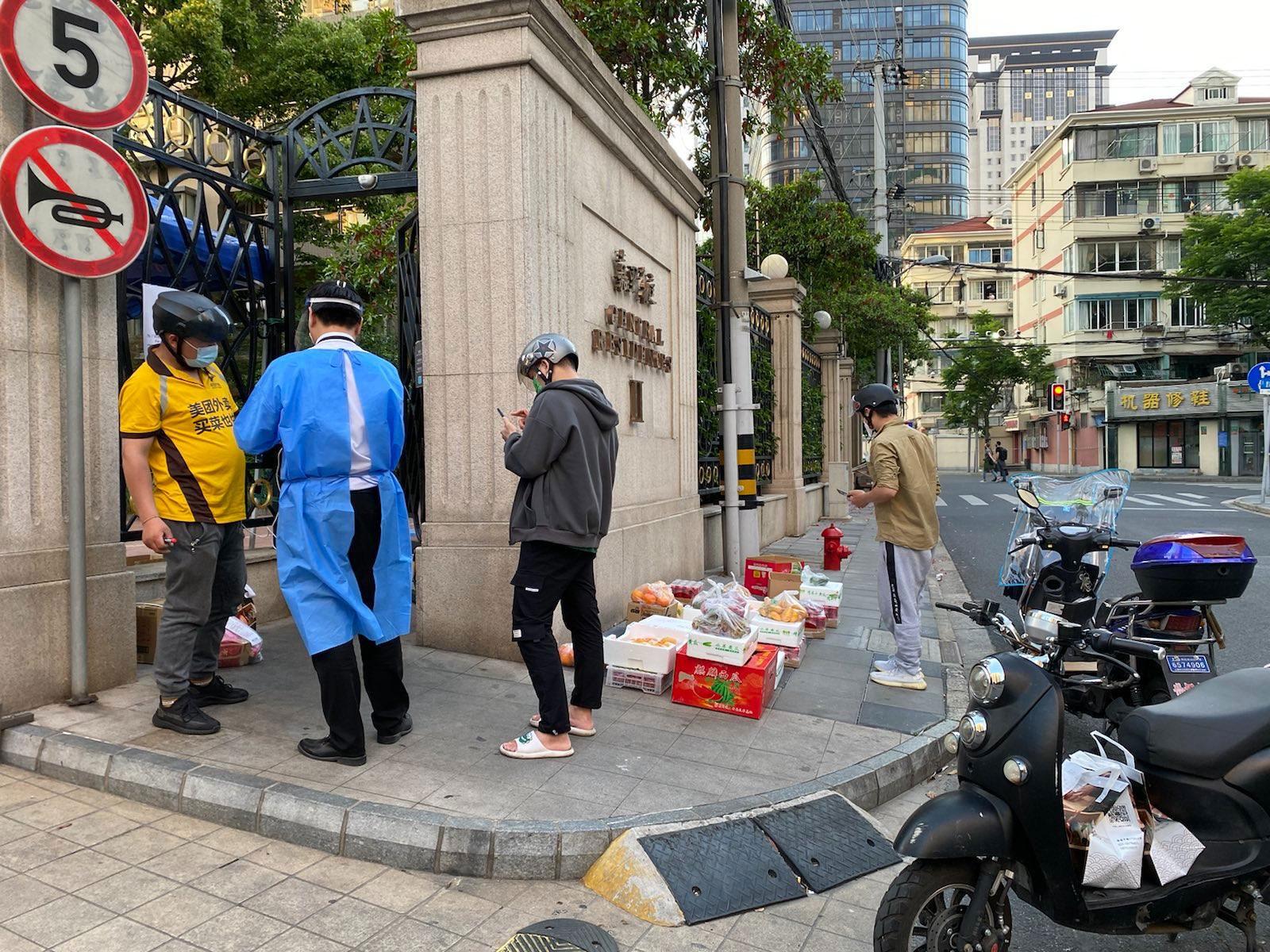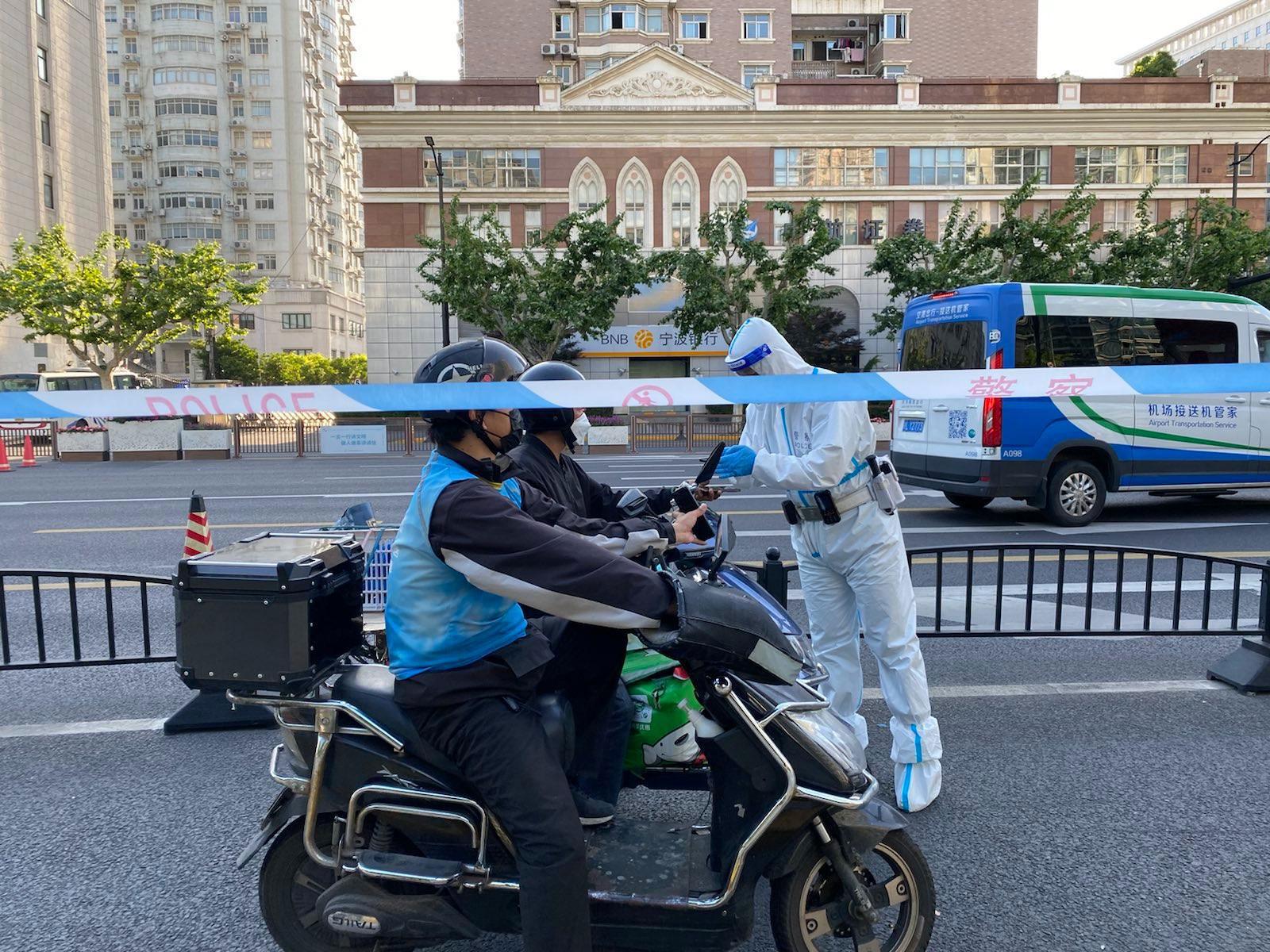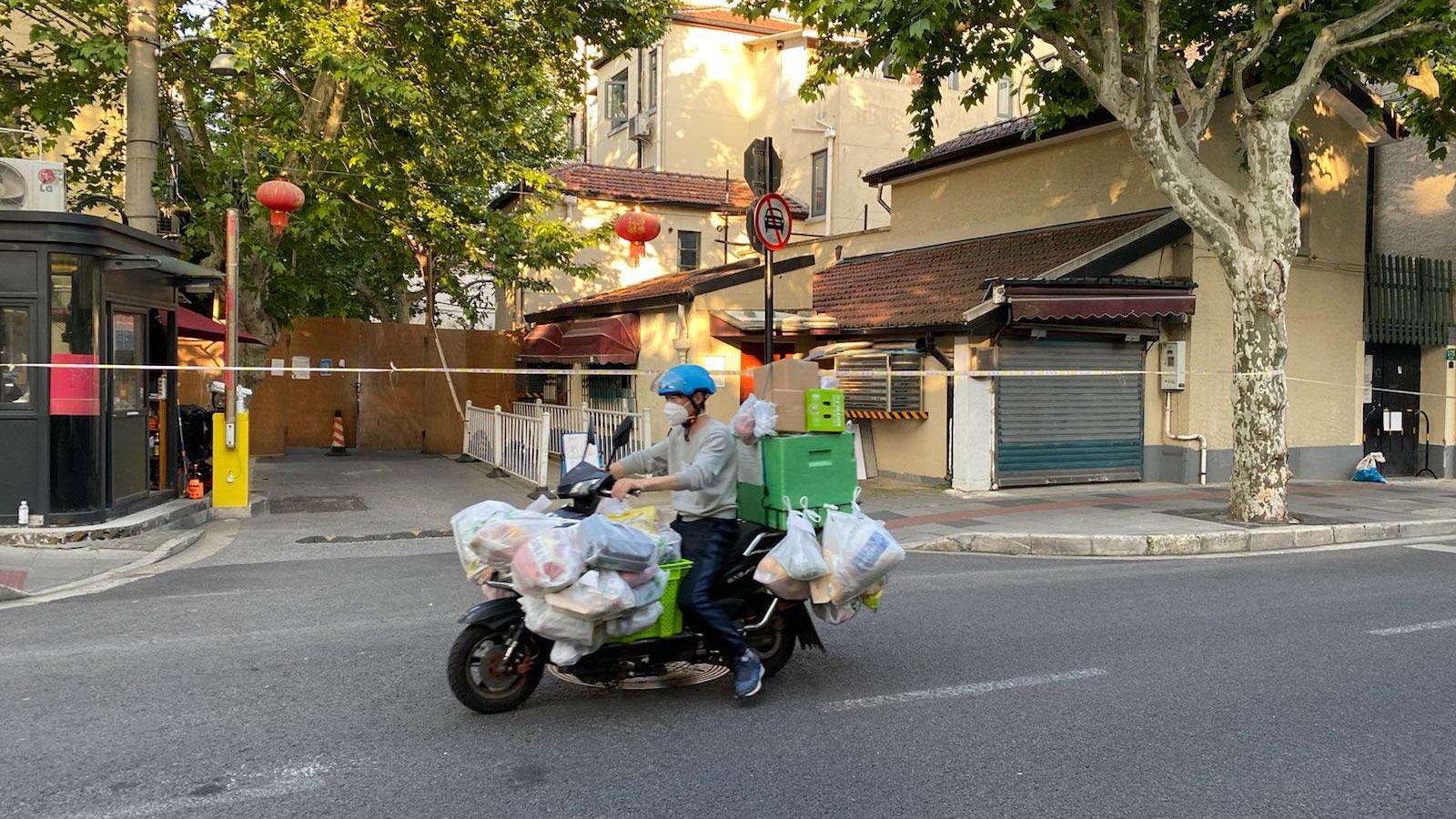Delivery driver Liu Yongliao takes a moment to rest between deliveries on the side of a wide, empty street in Shanghai.
He said that he works until 11 p.m. each night and averages around 50 to 60 deliveries a day. And that’s actually less than normal, because most businesses are still closed due to Shanghai’s strict COVID-19 lockdown.
Delivery workers like Liu, zooming by on electric scooters, are pretty much the only people on Shanghai streets now. For residents, they are the heroes who have kept the city running during the lockdown period.
After more than a month, millions of people in Shanghai are still stuck indoors. Some Shanghai residents have recently been given the all-clear to wander outside, depending on their COVID-19 test results, but few places are open.
Related: Pet owners in Shanghai struggle to care for their animals during COVID lockdowns
Shanghai streets remain empty and most shops are closed. Parks are blocked off, and cars are few and far between.
As the city loosens its lockdown restrictions, it still feels like a ghost town.
Liu Yongliao was stuck inside just like everybody else when the lockdown began. But last week, after testing negative multiple times, he got a pass that allows for him to get back to work.
China has an estimated more than 7 million couriers.
Drivers’ vests and helmets indicate their company affiliations: yellow for Meituan, blue for Eleme and Shansong, green for Dingdong. All drivers wear face masks and drive bikes weighed down with white plastic bags full of groceries or other essentials.

Most are migrant workers from smaller cities or rural areas who come to big cities for better pay. As part-time gig workers, though, they have less protection under the law. They can choose their own schedule, but have to put up with long hours and dangerous work conditions.
Related: Could a court case in Lebanon shift attitudes toward migrant domestic workers?
Researcher Zizheng Yu said that, even in normal times, the platforms’ algorithms have delivery workers constantly racing against the clock to get paid, because they don’t have a contract or a basic salary.
“They need to work really hard, to work more and they have to compete with the algorithm, and if they don’t deliver on time, then they will be deducted some pay. And so it hurts them a lot.”
“So, they need to work really hard, to work more and they have to compete with the algorithm, and if they don’t deliver on time, then they will be deducted some pay. And so it hurts them a lot,” he said.
Still, a fast delivery worker can earn $1,500 dollars a month — a pretty good salary in China.
Driver Liu Yongliao is 42 and never finished high school. He said he’s been willing to work as a delivery driver, because it’s the best way he can support his wife and child back home — nearly 900 miles away in Shaanxi Province. He’s held the job for three months.
Most people stuck indoors during the lockdown are dependent on couriers, while delivery workers are dependent on each other. They’ve created support groups on social media and share information on where to get a PCR test, where to find a decent meal or a place to stay.
Liu Yongliao said he’s been sleeping outside in a tent.
“If I go back home and there’s a positive [COVID-19] case, then I’m stuck inside and can’t work. … It’s hard, but there’s no other way during this time.”
“If I go back home and there’s a positive [COVID-19] case, then I’m stuck inside and can’t work,” he said. “It’s hard, but there’s no other way during this time.”

Lewis Li, who works informally as a volunteer to support delivery workers’ needs, said that only a fraction of the drivers have been allowed to keep working during the lockdown.
Shanghai’s COVID-19 lockdown restrictions have kept people confined to their homes for weeks on end. Delivery workers are only allowed out if there are no positive cases in their apartment compound, and after they have taken multiple COVID-19 tests.
“The ones who have been able to get out are prevented from going back to their homes at night because of the lockdown restrictions. … Their companies and the government have set up accommodations, but they’re often very far away, or don’t have enough beds, so many delivery people are sleeping under bridges or in the subway.”
“The ones who have been able to get out are prevented from going back to their homes at night because of the lockdown restrictions,” he said. “Their companies and the government have set up accommodations, but they’re often very far away, or don’t have enough beds, so many delivery people are sleeping under bridges or in the subway.”
During the lockdown, Li and other volunteers raised money and donated supplies to couriers. One courier named Su, who didn’t want to give his full name for fear of losing his job, said he picked up a sleeping bag, tent and yoga mat from a volunteer.
Su said he’s been a delivery worker for three years. During the lockdown, he’s been sleeping in a friend’s car parked on the side of the road.
“I’m working 12 hours a day delivering medicine mostly,” he said. “In normal times, I’d be delivering take-out, but most restaurants are still closed.”
Su said he does two or three rapid antigen tests per day. He must also register every 24 hours for a digital code that serves as a work pass.
Police are checking couriers’ passes at traffic lights. If they’re out on the street without a pass, he said they can be fined almost $100 and face up to 10 days in jail.

For many delivery workers, the financial incentives are a big draw toward working during the lockdown. Some said they can make more money than usual because of the high demand and tips from customers.
But another delivery worker named Liu, who wouldn’t give his full name, said he’s losing money by working during the lockdown because prices have gone up.
Food is more expensive and he spends a good portion of his earnings on a motel room, because he doesn’t want to sleep on the streets.
Related: Apps help cut food waste and costs in Canada as prices rise
Liu said he’s disappointed in how Shanghai authorities have handled the lockdown. It’s a real mess, he said.
Then, he zoomed off on his scooter to make another delivery.
